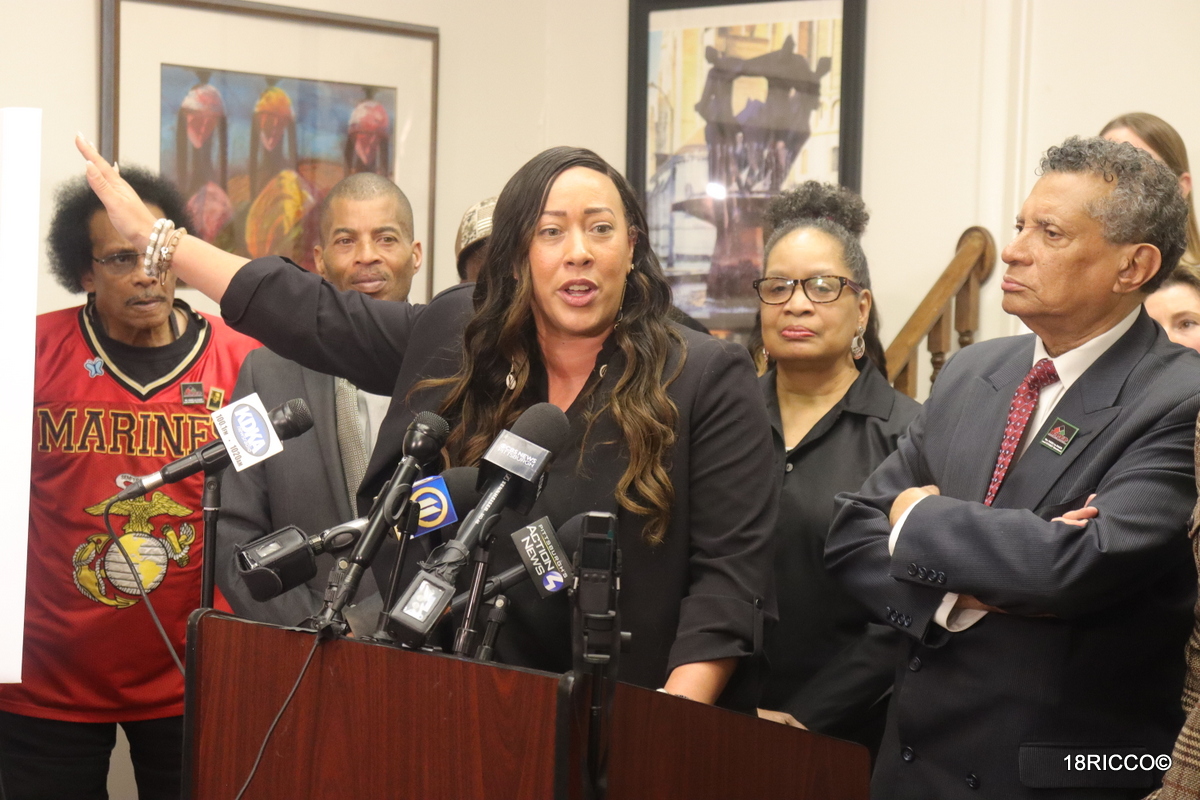DR. KYAIEN O. CONNER speaks at a press conference at Freedom Unlimited in the Hill District, March 17. Dr. Conner and others contend that DEI programs and principles are good for companies and organizations, despite what President Donald Trump says. (Photo by J.L. Martello)
B-PEP wants local companies to keep its DEI programs in place
U.S. President Donald Trump may be all about eliminating DEI altogether, but that’s not going to fly with Black Political Empowerment Project Chairman and CEO Tim Stevens.
Or Urban League of Greater Pittsburgh President and CEO Carlos Carter.
Or Dr. Kyaien O. Conner, a local college professor and associate dean for justice, equity, diversity and inclusion.
The three individuals were joined by a host of others at Freedom Unlimited in the Hill District, Monday morning, March 17, to denounce the elimination of DEI programs on a federal level being implemented by the current U.S. president. But they also had a message for all Pittsburgh-area companies and organizations: “Today we ask that leaders of corporations, companies, universities, colleges and major non-profits to not turn your back on what many of you have put into place, implemented and supported for years,” Stevens boastfully said. Many DEI policies were implemented following the death of a Black man, George Floyd, by a White police officer in Minneapolis in May 2020.
“For a moment, civil and human activists, and regular citizens, felt we had new friends and new partners in our multi-decade efforts to find true equality, fairness and opportunity throughout this nation,” Stevens continued. “Apparently, there are those who now feel that these goals have been met, within a mere four-plus years. Obviously, such an interpretation of history would be foolish.”
“Everything is not level,” added Carter. “So when people make statements in the (Trump) administration that it’s about merit, that’s insulting. If it were truly a merit-based country, Black people would have a lot of wealth.”
Carter also pointed out that DEI initiatives were helping not just Black people, but all people of color, including the LGBTQ community.
“There is no credible evidence that these (DEI) programs are discriminating against anyone. It’s just not true,” Carter said. “It’s about having goals, measuring them, and moving towards a more diverse country where everybody has opportunity.”
Carter said the National Urban League filed a lawsuit on Feb. 19 alleging that the Trump executive orders against DEI programs were hurting organizations across the country, and furthermore “marginalizes different populations.”
Dr. Conner, who said she was representing moreso herself than the local university where she’s employed, said that “DEI, Diversity, Equity and Inclusion, these are not just buzzwords; these are foundational principles, values that we stand on that ensure that our educational institutions are rich and diverse. That is part of the foundation that we should be standing on as Americans, that we embrace diversity. That we recognize and value our differences. That we understand that in the context of higher education, that it is this diversity that brings us together, where we can share our differences of opinions, or we can talk about difference of values, the way that we were raised, and how that brings us together to create complex and very effective solutions to some of our most critical problems in society.”
B-PEP works with many corporations in the Greater Pittsburgh area, primarily through its CEIR, or Corporate and Equity Inclusion Roundtable. The organization created a “SCORE” Playbook, with SCORE standing for “Strategies for Creating Opportunities through Retention and Engagement.” Stevens said that it’s clear, through interviews and other data points, that a diverse workforce is a good “business decision.” Stevens said that since 2000, Black buying power has grown to $2 trillion, and that inclusive companies have 2.3 times higher cash flow per employee than non-inclusive companies. Stevens also argued that “generating higher profits is 43 percent more likely among organizations with the most ethnically diverse boards.”
No local universities have publicly said that they were changing their DEI policies as of yet. But don’t think it’s not possible. Ohio State University closed its Diversity and Inclusion office as of Feb. 28. OSU president Ted Carter wrote to students, in part: “This is a complex and rapidly changing environment, involving multiple court cases at various stages in the legal process. We can’t predict the outcome of any one legal case, but what we do know is this: Taken together, the actions at the state and federal levels and the guidance we’ve received from our state and federal leaders provide a clear signal that we will need to make changes now in the way we have historically gone about our work in DEI.”
Prior to Ohio State, West Virginia University announced in late January that it would be closing and eliminating its DEI programs, too.
“We are asking for these leaders, both locally and nationally, to not be intimidated by anyone,” Stevens said at the press conference, “regardless of their position, to dissuade these leaders from what they know, in their hearts, to be right.”
